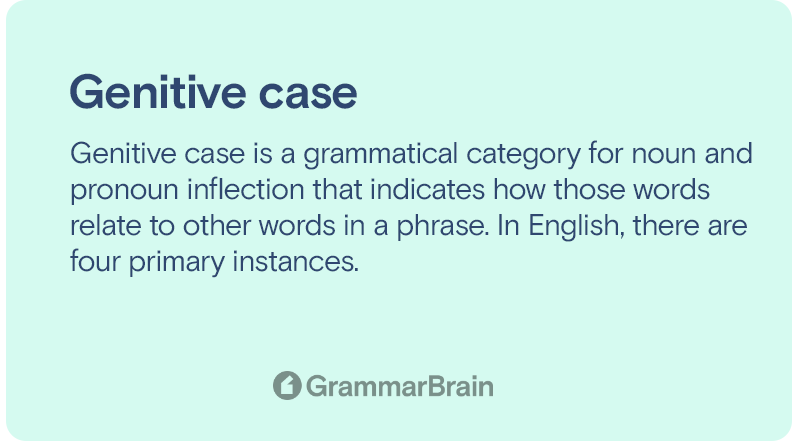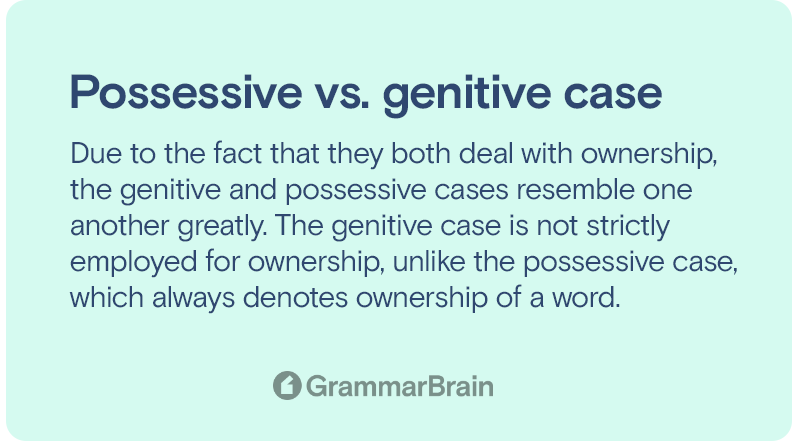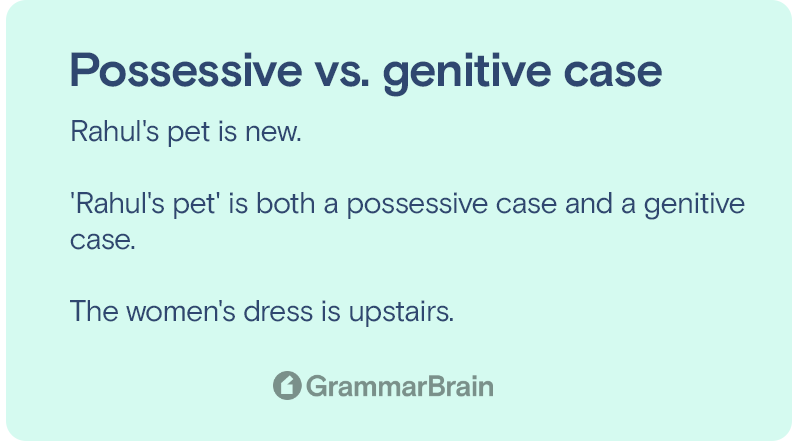What is the genitive case? How does it work? An adjective, pronoun, or noun that modifies another noun is used with the genitive case in English grammar. The genitive case is most frequently employed to indicate possession, but it can also indicate the origin of an object, quality, or trait of something.

What is the Genitive Case?
An apostrophe and the letter “s” are typically added to the end of a noun to establish the genitive case.
Genitive case is a grammatical category for noun and pronoun inflection that indicates how those words relate to other words in a phrase. In English, there are four primary instances.
- Nominative Case: When a pronoun or noun is the object of a verb, it is referred to as being in the nominative case.
- Genitive Case: The case used for a noun, pronoun, or adjective to indicate ownership of a noun is known as the genitive case.
- Accusative Case: When a pronoun or noun is employed as a direct object, it is said to be in the accusative case.
- Dative Case: When a noun or pronoun is an indirect object, it is placed in the dative case.

Possessive case vs. genitive case
Due to the fact that they both deal with ownership, the genitive and possessive cases resemble one another greatly. The genitive case is not strictly employed for ownership, unlike the possessive case, which always denotes ownership of a word.
Example:
- Rahul’s pet is new.
- ‘Rahul’s pet’ is both a possessive case and a genitive case.
- The women’s dress is upstairs.
In this example, the dress doesn’t belong to women. This is not a possessive case and hence becomes a genitive case.

Genitive adjectives and pronouns
The genitive case also includes possessive pronouns and possessive adjectives. According to its function to demonstrate possession, the noun gets altered in the genitive case.
Possessive adjective/noun
- My/I
- Your/you
- She/he/it
- Our/we
- Their/they
What type of genitives can get used? (Genitive forms)
Here are the four primary forms of genitives:
Possession Genitive:
This one is self-explanatory. The possessive case tells us who owns a thing. However, there are a lot of connections that are very loosely comparable to possession and fall into this category.
Such as “my child,” “my god,” and possibly even “my guy.”
Genitive of Description:
Although all genitives used with nouns describe, grammarians prefer to refer to more qualitative descriptions using this phrase.
For instance, “vir magnae sapientiae” means a very wise man or a man with considerable intelligence.
The genitive of description requires that it be made up of a noun and an adjective when employed correctly as a technical term of accepted grammar.
To put it another way, you would say sapiens rather than “vir sapientiae.”
Genitive of Material:
Refers to the usage of the genitive to describe the substance from which something is formed, such as a marble statue, milk and honey rivers, volumes of examples, etc.
You can see that the genitive is just being used in a certain way to make an adjectival alteration.
Genitive of Characteristics:
With the category “genitive of description,” the name “genitive of characteristic” nearly seems redundant. But grammar is a technical subject, and this is a technical phrase with a very clear definition.
We have a genitive of characteristic when the verb “to be” (or an equivalent expression) is found in the genitive case. And appears to NOT be moderating a noun but is followed by an infinitive.
The fact that the “genitive case” is not always employed to demonstrate possession is the largest problem English language learners have with it. It can be used to demonstrate how two items are related.
The word “genitive” should not be associated too strongly with concepts of ownership, actual possession, or belonging, much like with possessives.
Although there may only be a tenuous association between the objects that the nouns refer to, the genitive case indicates a structural, grammatical connection between a noun and a noun phrase.
| Genitive case example | Genitive case |
| His dinner. | His. |
| Dinner of the dog. | Of the dog. |
| Dog’s dinner. | Dog’s. |
Examples of the genitive case (sentences)
- This is Remy’s hat.
- This is his hat.
- Rohan’s car is parked.
- His car is parked here.
- Is that your car?
- This is Ram’s friend.
- What is your salary?
- This is his bat.
- This dress is Anna’s.
- We are at Allen’s place now.
- Is Tom your brother?
FAQs
What does a sentence’s genitive mean?
The genitive, also known as the genitive case, is a noun case primarily used to indicate possession in the grammar of various languages. The genitive form of a noun or name in English is commonly referred to as the addition of the letter “s,” as in “dog’s” or “Anne’s.”
How is the genitive case used?
The genitive case is mainly used to express a relationship between two nouns, such as possession. As a result, it frequently takes the form of a noun phrase; hence, my moniker, the “gregarious genitive,” as it enjoys socializing with other nouns. The color orange represents the genitive.
What is the genitive case location?
The genitive case is frequently employed to demonstrate possession. Most people will come across the term “genitive case” when learning a language other than English. With nouns, it is typically generated by adding ‘s’ to the word or by preceding it with “of.”
How is a genitive case created?
The genitive case, also known as the possessive case, is created by adding the apostrophe S (‘s) to indicate possession, that something belongs to another or a certain kind of relationship between objects.
What has a genitive ending?
The genitive’s endings: -es and -s
In addition to altering the article and adjectives, the Genitive also alters the end of the Genitive itself.
The genitive ends with a -es or -s.
What distinguishes the genitive from the nominative case?
The subject and the object of sentences containing the verb “to be” are in the nominative case. In most cases, the English words “of” or “from” can be used to translate the genitive, which expresses the relationships between nouns.
How do most masculine and neuter nouns end?
As a rule, multi-syllabic masculine and neuter nouns end with “-s.” Similar to plural nouns not ending in “-s”.
Are genitive personal pronouns rare?
Yes, they are very formal and not used often.
Are possessive determiners and possessive adjectives the same?
Yes, they play the same function when we think about the genitive case.
Inside this article
Fact checked:
Content is rigorously reviewed by a team of qualified and experienced fact checkers. Fact checkers review articles for factual accuracy, relevance, and timeliness. Learn more.
Core lessons
Glossary
- Abstract Noun
- Accusative Case
- Anecdote
- Antonym
- Active Sentence
- Adverb
- Adjective
- Allegory
- Alliteration
- Adjective Clause
- Adjective Phrase
- Ampersand
- Anastrophe
- Adverbial Clause
- Appositive Phrase
- Clause
- Compound Adjective
- Complex Sentence
- Compound Words
- Compound Predicate
- Common Noun
- Comparative Adjective
- Comparative and Superlative
- Compound Noun
- Compound Subject
- Compound Sentence
- Copular Verb
- Collective Noun
- Colloquialism
- Conciseness
- Consonance
- Conditional
- Concrete Noun
- Conjunction
- Conjugation
- Conditional Sentence
- Comma Splice
- Correlative Conjunction
- Coordinating Conjunction
- Coordinate Adjective
- Cumulative Adjective
- Dative Case
- Determiner
- Declarative Sentence
- Declarative Statement
- Direct Object Pronoun
- Direct Object
- Diction
- Diphthong
- Dangling Modifier
- Demonstrative Pronoun
- Demonstrative Adjective
- Direct Characterization
- Definite Article
- Doublespeak
- False Dilemma Fallacy
- Future Perfect Progressive
- Future Simple
- Future Perfect Continuous
- Future Perfect
- First Conditional
- Irregular Adjective
- Irregular Verb
- Imperative Sentence
- Indefinite Article
- Intransitive Verb
- Introductory Phrase
- Indefinite Pronoun
- Indirect Characterization
- Interrogative Sentence
- Intensive Pronoun
- Inanimate Object
- Indefinite Tense
- Infinitive Phrase
- Interjection
- Intensifier
- Infinitive
- Indicative Mood
- Participle
- Parallelism
- Prepositional Phrase
- Past Simple Tense
- Past Continuous Tense
- Past Perfect Tense
- Past Progressive Tense
- Present Simple Tense
- Present Perfect Tense
- Personal Pronoun
- Personification
- Persuasive Writing
- Parallel Structure
- Phrasal Verb
- Predicate Adjective
- Predicate Nominative
- Phonetic Language
- Plural Noun
- Punctuation
- Punctuation Marks
- Preposition
- Preposition of Place
- Parts of Speech
- Possessive Adjective
- Possessive Determiner
- Possessive Case
- Possessive Noun
- Proper Adjective
- Proper Noun
- Present Participle
- Prefix
- Predicate



